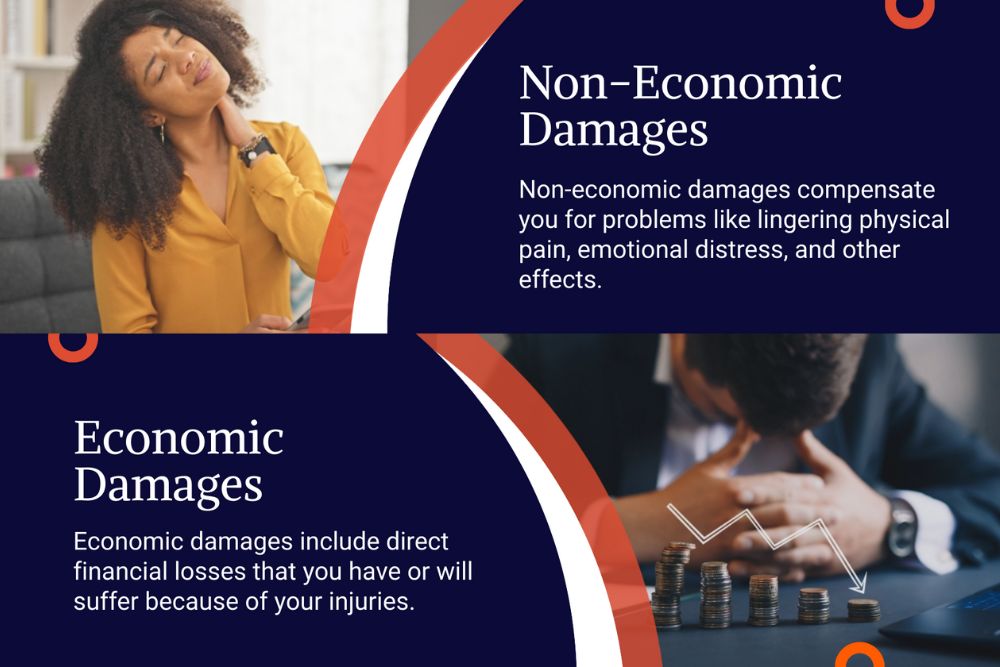Guide to Pain and Suffering in Michigan


Key Takeaways:
- One of the damages you can recover after a personal injury is pain and suffering.
- To recover pain and suffering, you must file a personal injury lawsuit against the at-fault driver.
- The statute of limitations for a personal injury claim in Michigan is three years.
- In Michigan, you must meet the bodily injury threshold to recover non-economic damages like pain and suffering.
- Your pain and suffering award will be reduced based on how at-fault you are for the accident.
If you have recently been involved in an accident, you may have found that Michigan insurance laws are not very straightforward. Michigan’s no-fault law, while intended to make sure accident victims can recover compensation for their injuries, can be quite confusing. Even once you understand how the no-fault law works, you might still wonder if you can sue the other driver.
You might need to file a lawsuit if you want to recover certain types of damages, including compensation for pain and suffering. The injury lawyers at Matz Injury Law are here to help you understand the laws surrounding pain and suffering and get compensation for your losses.
Michigan law allows injury victims to recover several kinds of damages in various circumstances. Economic damages include direct financial losses that you have or will suffer because of your injuries, such as:
- Medical bills, including ongoing and future medical treatment
- Past and future lost wages
- Rehabilitation and other expenses related to your injuries
- Property damage
- Funeral expenses in wrongful death cases
What is Pain and Suffering?
In personal injury terms, pain and suffering is a type of non-economic damage. It does not compensate you for something that has directly cost you money. Instead, it tries to compensate you for the reduction in your quality of life as a result of your injuries. Pain and suffering damages address problems like lingering physical pain, emotional distress, and other effects.
Car accidents, dog bites, medical malpractice, and other personal injury incidents can affect your well-being long after you have received medical treatment.
What Are the Different Types of Pain and Suffering in Michigan?
Several conditions that can result from injuries sustained due to the negligence of another person can be classified as pain and suffering in Michigan.
Denial of Social Pleasure and Enjoyment
If you cannot participate in or enjoy activities like you did before you sustained your injuries, you could have a claim for denial of social pleasure and enjoyment. You might be in too much physical pain or find that a hobby or other activity you once enjoyed now triggers a traumatic response.
Embarrassment, Humiliation, or Mortification
Accident injuries can cause profound feelings of shame or embarrassment. These feelings can prevent you from returning to a normal life.
Fright and Shock
People may develop symptoms of post-traumatic stress disorder (PTSD) from many types of injuries after an accident. This could happen if they suffered painful or life-threatening injuries, or if they feared that their accident would end their lives.
Mental Anguish
Injury victims may experience a wide range of mental and emotional responses in the aftermath of an accident, including depression, anxiety, fear, and anger. These feelings can be overwhelming and can interfere with or even prevent their recovery.
Physical Pain and Suffering
Injuries can have physical effects that persist long after the accident, and even long after the completion of your treatment and rehabilitation. Headaches and neck, back, joint, or muscle pain are common effects of accident injuries that can have a severe impact on quality of life.
Is There a Statute of Limitations for Pain and Suffering in Michigan?
Michigan law imposes a deadline for filing a personal injury lawsuit, known as the statute of limitations. For a lawsuit for pain and suffering after a Michigan car accident or other event leading to injuries, the statute of limitations is three years.
How Much Can You Sue for Pain and Suffering in Michigan?
No-fault insurance coverage only provides compensation for medical bills and certain other economic damages. In order to recover damages for pain and suffering and other non-economic losses, you have to file a claim with the at-fault party’s insurance company, and it might be necessary to file a lawsuit. Michigan’s no-fault law for car accident claims only allows fault-based claims for non-economic damages in cases involving “death, serious impairment of body function, or permanent serious disfigurement.”
If you meet this threshold injury requirement, the amount that you can recover for pain and suffering in Michigan depends on numerous factors, including:
- The severity of your injuries
- The length of time they are likely to affect you
- Whether or not you are able to reach a settlement agreement
What is Necessary in Order to Sue for Pain and Suffering in Michigan?
You will need evidence of your injuries and their impact on your well-being in order to claim pain and suffering damages. Evidence may include medical records, testimony from doctors, and other witnesses or materials that may help show how your injuries have affected you.
Before you can present evidence of your pain and suffering in an insurance claim or lawsuit, you must establish that the defendant is liable for your injuries. Most personal injury claims are based on the legal theory of negligence. Suppose you were injured in a car accident after the defendant ignored a stop sign and hit your vehicle. You would have to prove the following four points to establish negligence:
- The defendant owed a duty of care to obey traffic laws and operate their vehicle safely.
- The defendant breached their duty of care by committing the traffic offense of running a stop sign.
- This breach caused your injuries. You must show that the collision resulted from the defendant running the stop sign and that your injuries resulted from the collision.
- You suffered damages because of your injuries. You must demonstrate that your injuries caused losses, such as medical expenses and lost wages.
Michigan has additional requirements for car accident claims that seek non-economic damages. You must meet a “bodily injury threshold,” also known as the “tort threshold,” in order to claim pain and suffering damages. In cases that do not allege wrongful death, Michigan law requires proof of “serious impairment of body function” or “permanent serious disfigurement.”
Definition of Serious Impairment of Body Function
State law defines “serious impairment of body function” in three parts:
- It must be “objectively manifested,” meaning that someone other than the injury victim can observe the symptoms.
- The impaired bodily function must be “of great value, significance, or consequence to the injured person.”
- The impairment must affect “the person’s capacity to live in his or her normal manner of living.”
The law does not require the impairment to have any specific duration, such as six months or longer.
What Factors Does a Jury Consider in Deciding the Amount of Damages for Pain and Suffering?
While each personal injury case presents unique facts, a jury will consider the following circumstances in almost any case:
- The defendant’s liability
- Whether the plaintiff was partly at fault for the accident
- The credibility of each party and their evidence and witnesses
Michigan’s comparative fault law allows a plaintiff to recover damages even if they were partly at fault for the accident, but only if their share of the fault is less than 50%. The amount they can recover must be reduced by their percentage of fault. A plaintiff found to be 10% at fault, for example, would have their final award reduced by 10%.
Before a jury can get to questions about the amount of damages to award to you, you must prove that the defendant was negligent and that you experienced pain and suffering as a result. Medical records are essential to proving your injuries. Witness testimony about how your injuries have affected you is necessary to establish non-economic losses.
Why Choose Matz Injury Law?
- Most law firms charge the legal maximum, 33 1/3% of your settlement. At Matz, we only charge 22%. Keep more money with Matz.
- We travel all across Michigan to help our clients. We have driven hundreds of miles to provide compassionate, dedicated representation for those who need it.
- We have decades of experience helping accident victims. We know Michigan law, we know the courts, and we know how to fight for you.
- When you work with Matz Injury Law, you always work with either Steven Matz or Jared Matz. Our family is in the business of helping your family.
- We have won over $300 million in awards and settlements for our clients.
Pain-and-Suffering Settlements
Some of our recent settlements include:
- $1.74 million settlement against a 19 year-old driver and the fraternity where he was drinking immediately prior to a head on collision that killed a 52 year-old husband and father of 3 children.
- $3.45 million settlement against a cement company whose truck crossed a center line causing three deaths and severely injuring a 4 year-old boy. The settlement was $450,000 in excess of available insurance.
- $1.3 million Federal District Court settlement on behalf of a mother and daughter in a car/truck collision. Mom suffered a pancreas injury but returned to full-time employment within six months; eight year old daughter suffered an aggravation of a pre-existing learning disability as well as a ruptured spleen.
Testimonials
Hear what one of our clients had to say about her Matz Injury Law experience.
“My family is grateful for Steve Matz’s professional handling of our case. Steve was very thorough, candid, responsive, and strategic in his approach throughout our legal proceedings. If ever in a situation again like my family has experienced over the past year, we would immediately retain Matz Injury Law to represent our interests. Thank you Steve.” – John P.
Are You Ready to be Compensated? Matz Injury Law is Ready to Help.
Ready to discuss your case? Talk to the personal injury lawyers at Matz Injury Law by calling 866-226-6833 or completing our online contact form, and we’ll be in touch immediately.
Frequently Asked Questions
There is no set formula for calculating pain and suffering, but your lawyer can help you calculate a fair amount based on how injured you are, how long you are injured, and how much of an impact your injuries have had on your life.
You can prove your pain and suffering through medical records, testimonials from your loved ones, and testimonials from mental health counselors. You can also keep a journal documenting your emotional and physical pain following your accident.
There is no legal limit on the amount of pain and suffering damages you can receive in Michigan. The limit is how much a judge or jury will award you at trial or the limit of the at-fault driver’s insurance policy in a settlement.



